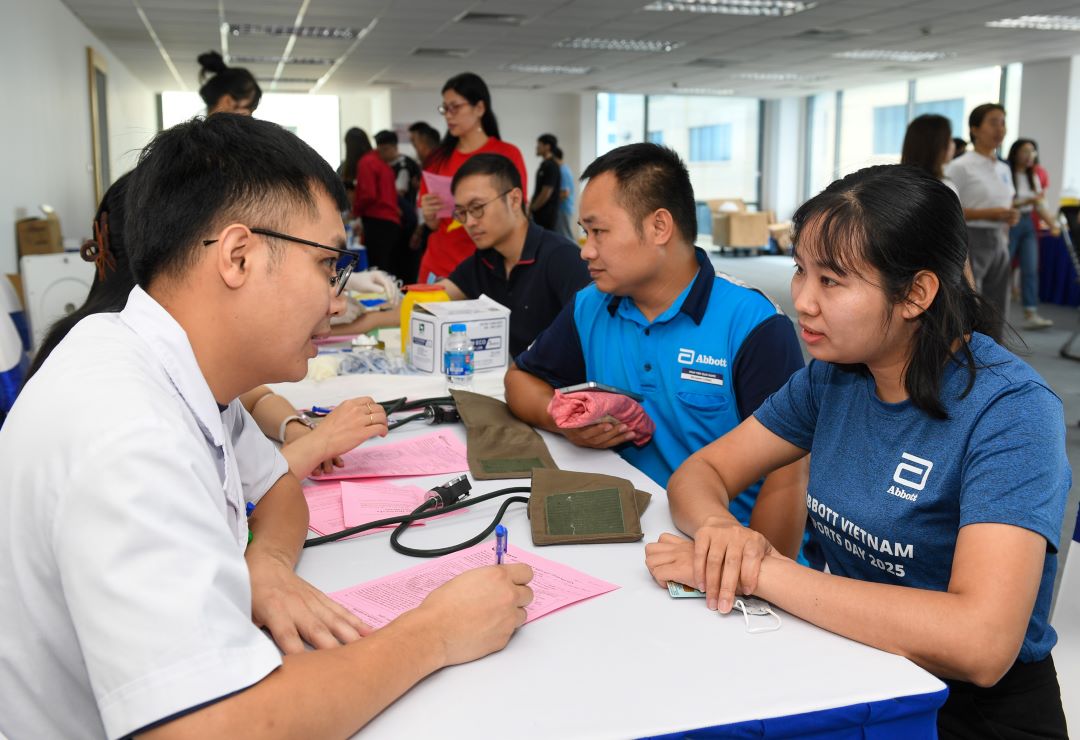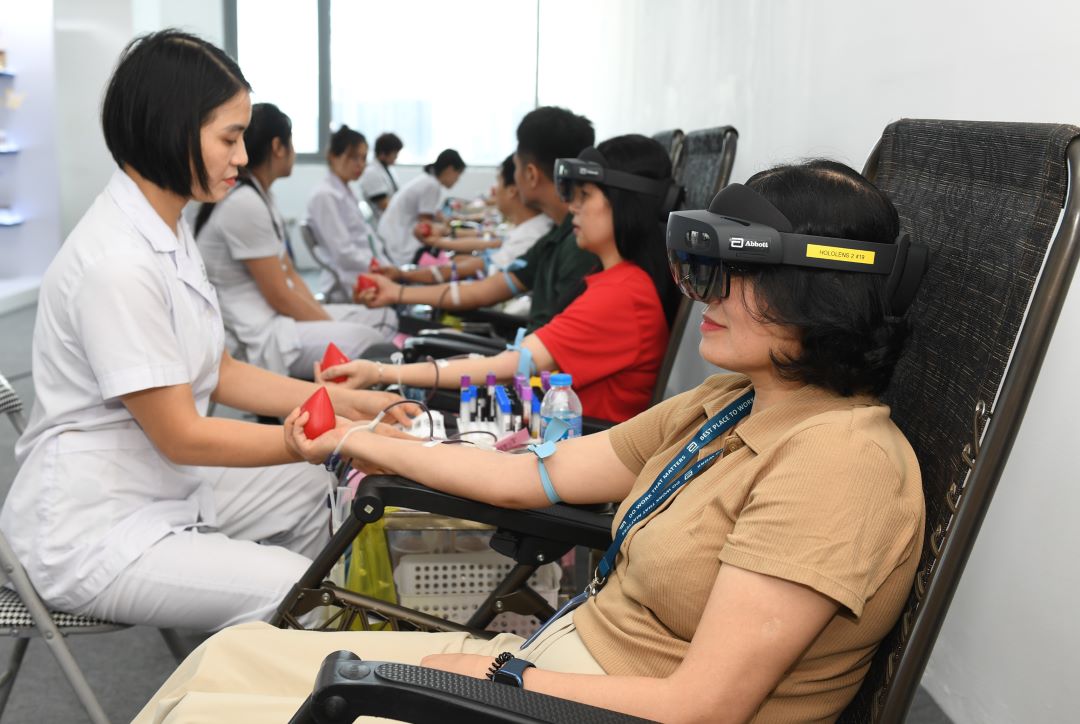At the events, blood donors wore transparent virtual reality headsets, allowing them to relax during the donation process while ensuring medical professionals could continuously monitor their condition and interact with them.
The integrated virtual reality blood donation experience is an initiative developed by Abbott in collaboration with Blood Centers of America (BCA), the largest blood supply network in the US. It was introduced in Abbott's voluntary blood donation program in Vietnam in 2024.
This year, the experience was upgraded with two options: relaxing with music and planting trees in a digital garden, or participating in a game of building a robot team to explore the universe, bringing a sense of fun and reducing stress.
Doan Thi Thanh Thuy, an Abbott Vietnam employee participating in the event in Hanoi, said it was her first time donating blood and she was understandably nervous. However, just a few minutes after putting on the virtual reality headset, her anxiety disappeared. "I felt like I was traveling into a vivid virtual world. The blood donation experience, which I thought would be stressful, became much more gentle and pleasant," she shared.
 |
Abbott Vietnam employees participate in the annual voluntary blood donation program. Photo: Hoang Anh |
Abbott Vietnam employees participate in the annual voluntary blood donation program. Photo: Hoang Anh
Dr. Nguyen Thi Hong Trang from the National Blood Transfusion Center, Viet Duc Friendship Hospital, praised the blood donation activity combined with virtual reality technology. "When I experienced it myself, I also found it new and interesting. This is a very good combination to encourage more people to donate blood, especially those who are still hesitant or first-time donors," Dr. Hong Trang said.
According to a study conducted by Abbott in early 2024, 68% of people who had felt anxious before donating blood said that virtual reality technology helped them reduce stress significantly. Notably, 89% of participants wanted to continue donating blood after the experience.
Since the government launched the voluntary blood donation movement in 2000, the activity has spread widely. In 2024, the country received more than 1.7 million units of blood, a 7.4-fold increase compared to 2000. Of this, 98% of the blood supply came from voluntary donors, according to the National Steering Committee for Voluntary Blood Donation.
Abbott's initiative is expected to contribute to attracting the community, especially young people, to participate in regular blood donation, helping to ensure a blood supply for emergencies and treatment. In the coming period, the integrated virtual reality experience for blood donation is expected to be introduced at blood transfusion centers in Hanoi and Ho Chi Minh City, creating opportunities for many people to access and experience it.
 |
Integrated virtual reality technology helps blood donors relax and reduce stress. Photo: Hoang Anh |
Integrated virtual reality technology helps blood donors relax and reduce stress. Photo: Hoang Anh
Innovating the blood donation experience is part of Abbott's journey in applying technology to change the way healthcare is managed and delivered, improving treatment effectiveness and quality of life for people.
Abbott has brought many advanced solutions to Vietnam, such as the FreeStyle Libre continuous glucose monitoring system, which helps people with diabetes monitor their glucose levels with a small sensor worn on the back of their arm. FreeStyle Libre not only provides current blood glucose levels but also glucose trends, supporting users in adjusting their lifestyle and helping doctors make appropriate treatment decisions, reducing the risk of complications.
Combined with this is Glucerna, a scientifically formulated nutritional supplement that supports blood sugar control and improves insulin resistance, providing a comprehensive solution to help patients proactively live healthier lives every day.
In addition, scientific nutritional products such as Ensure and PediaSure help support immune system enhancement and improve malnutrition in many groups, from young children to the elderly and people with chronic diseases.
In the field of diagnostics and treatment, the company supports medical staff in making effective and appropriate treatment decisions, thereby improving treatment effectiveness. The Alinity testing system is a prime example, providing testing solutions from biochemistry, immunology, hematology, and molecular diagnostics with high performance and superior accuracy. The system allows for the automation of the testing process, supporting faster and more accurate diagnosis and treatment.
In the field of cardiology, Abbott has brought to Vietnam many modern medical technologies such as the Xience drug-eluting stent, optical coherence tomography (OCT) technology for coronary arteries, and the Ensite X 3D mapping system for the treatment of cardiac arrhythmias.
Another invention of the company is the Amplatzer Piccolo Occluder, which helps doctors close holes in the hearts of newborns weighing as little as 700 grams without surgery. Recently, Abbott's HeartMate 3 left ventricular assist device has also been successfully implanted in Vietnam, opening up opportunities to extend and improve the quality of life for heart failure patients.
From the virtual reality blood donation experience to life-changing medical solutions, Abbott's initiatives demonstrate a sustainable commitment to improving the quality of life for communities in more than 160 countries. Present in Vietnam since 1995, Abbott has invested over 280 billion VND through programs to improve nutrition, support the treatment of chronic diseases, provide professional training for medical staff, and raise public awareness, while contributing to the sustainable development of the healthcare system.
Mr. Douglas Kuo, Vice President and General Manager of Abbott Vietnam, shared on the occasion of Abbott's 30th anniversary in Vietnam that the company is committed to improving healthcare quality through technology and initiatives to build a healthier and more sustainable future for the Vietnamese people.
The Dan












